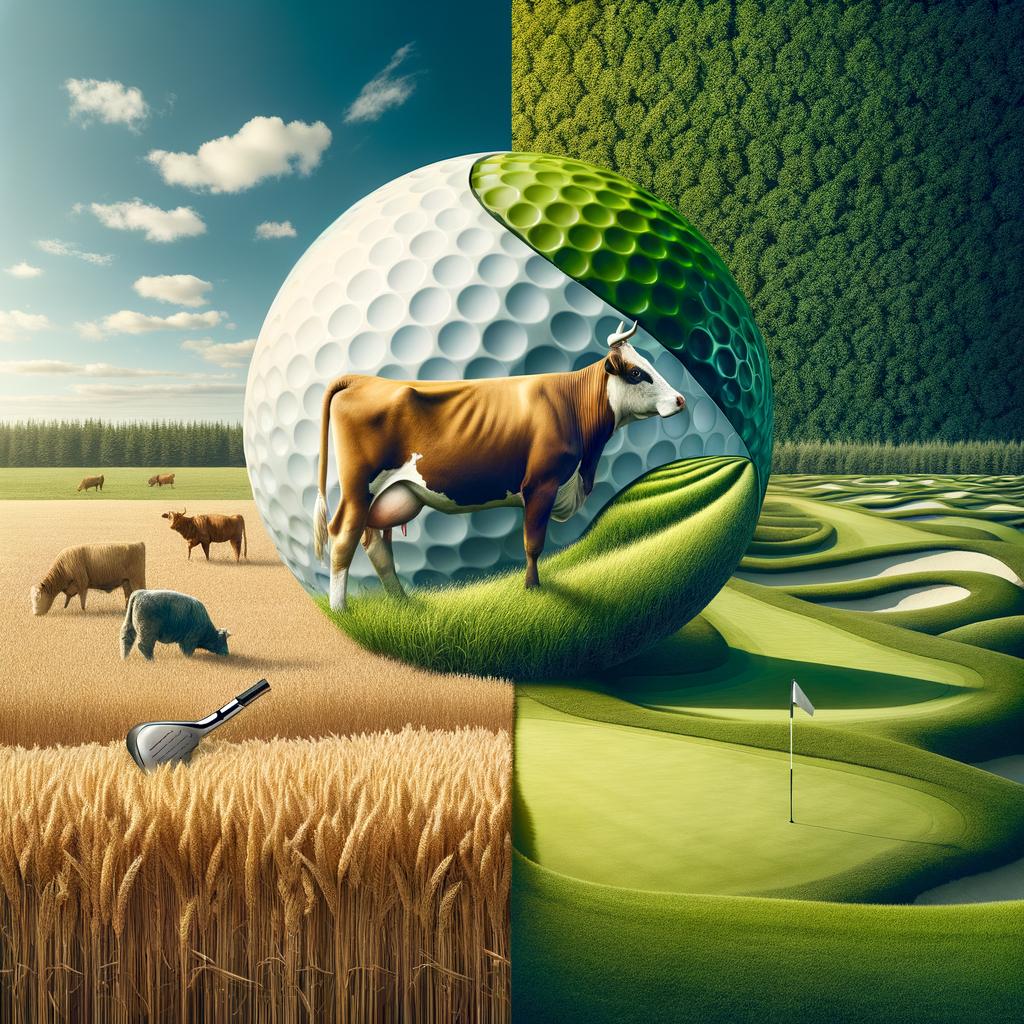Brora Golf Club in Scotland is contemplating a controversial decision to ban grazing cattle and sheep from its historic links course. The club argues that the presence of these animals detracts from turf quality and hampers its competitive standing among more meticulously maintained golf courses. As debates about the balance between natural ecosystem and golfing excellence intensify, local golfers express mixed feelings about the potential changes to their cherished course.
The Growing Conflict Between Livestock and Golfing Greens
In an evolving dilemma for golf course management, Brora Golf Club in Scotland is considering a ban on livestock grazing due to the potential damage to the greens. The iconic course, which has welcomed grazing cattle and sheep for decades, finds itself at a crossroads as the quality of the turf begins to deteriorate. This decision is spurred by concerns that livestock can detract from the playing experience and increase maintainance costs for the club.
Members of the club have expressed worries about the impact on course conditions, including uneven surfaces caused by hoofprints and the possibility of increased pest activity due to dung accumulation. Notably, the following factors highlight the concerns of course management:
- Quality of Play: the presence of livestock can lead to an unpredictable playing surface.
- Maintenance Expenses: Higher costs may arise from extensive upkeep to counteract livestock damage.
- Health Risks: There are potential health threats associated with livestock, including the transmission of diseases through waste.
As discussions progress, the club is weighing the benefits of traditional practices against modern standards of play and maintenance. While the nostalgic value of grazing cattle adds charm to Brora,club officials are evaluating the necessity of enhancing the course’s prestigious reputation. The decision could set a significant precedent for other golf courses in Scotland contemplating similar management strategies to balance tradition with contemporary golfing standards.
Impact of Grazing on Course Conditions and Player Experience
grazing livestock,such as cows and sheep,can substantially alter the ecological balance of a golf course,impacting both course conditions and player experience. While some argue that these animals contribute to a natural landscape, their presence can lead to issues like overgrazing and detrimental wear on the turf. This can result in uneven ground,bald patches,and increased maintenance requirements,ultimately affecting playability and aesthetics.
Moreover, the vocalizations and movement of grazing animals can be disruptive for golfers seeking a serene experience. The presence of livestock frequently enough draws attention away from the game, impacting concentration and enjoyment. This sentiment is echoed in the opinion of many players who favor a more traditional golfing habitat free from agricultural distractions. Thus,courses weighing a ban on grazing animals might potentially be striving to enhance the overall golfer experience by prioritizing a tranquil setting.
Lastly,managing the waste produced by these animals poses an environmental challenge. Accumulation of manure can lead to increased nutrient runoff into surrounding water bodies, which not only affects course maintenance but also raises concerns about local biodiversity. By eliminating grazing on the course, facilities can focus on sustainable practices that maintain course health and uphold player satisfaction. Ultimately, the decision to ban livestock reflects a commitment to providing the best possible golfing conditions.
Environmental Concerns: Balancing Biodiversity with Golfing Needs
As discussions around environmental sustainability intensify,one iconic Scottish golf course is contemplating a ban on grazing cows and sheep. This decision stems from concerns over how livestock impact the delicate ecosystem and biodiversity of the area. While the tradition of grazing has ancient significance, the course’s management argues that it may be counterproductive to the environmental goals they aim to achieve.
The ongoing dilemma highlights the need to find a compromise between maintaining traditional agricultural practices and promoting the health of local wildlife.Key considerations for this decision include:
- Biodiversity Protection: livestock can disrupt local habitats, leading to decreased populations of native flora and fauna.
- Water Quality: Increased nutrient runoff from animal waste can harm nearby water sources, affecting both aquatic life and golf course maintenance.
- Land Management: The need for sustainable practices that allow for both recreational use and ecological preservation is paramount.
Opponents of the proposed ban argue that livestock are integral to the course’s character and maintenance. However, proponents assert that the long-term benefits of a more biodiverse and resilient ecosystem will outweigh the short-term loss of traditional farming practices. By fostering an environment where nature thrives, the course could set a precedent for responsible golf management that prioritizes ecological health alongside athletic enjoyment.
Recommendations for Sustainable Management and Alternative Solutions
As the debate over livestock presence on this iconic Scottish course continues, several recommendations are emerging to ensure sustainable management practices that balance environmental health with the course’s aesthetic appeal. Implementing eco-friendly landscaping techniques can significantly reduce the need for grazing animals. Strategies such as seed selection of native grasses and the incorporation of wildflower meadows can create a resilient ecosystem that supports biodiversity while minimizing water usage and chemical fertilizers.
Furthermore, integrating advanced water management systems could address the potential soil compaction and erosion caused by grazing animals. The introduction of precision irrigation and rainwater harvesting systems can enhance water conservation efforts,ensuring that the course maintains its lush greens without the environmental footprint associated with livestock.The use of organic soil enhancers will promote a healthier turf that can withstand the elements better than traditional grass types.
considering alternative livestock-free practices such as robotic lawn mowers can provide a modern solution to course maintenance.These technologies offer a sustainable approach to grass management that eliminates the environmental concerns of animal grazing while maintaining the necessary upkeep of the course. By embracing these innovative practices,the management team can not only enhance the course’s reputation but also lead the way in sustainable golfing.
As the debate continues, the Brora golf club’s management is faced with a challenging balance between preserving the unique charm of the course and addressing the practical concerns of playability and maintenance. How this situation unfolds may set a precedent for similar courses facing similar dilemmas. Stakeholders are encouraged to engage in constructive dialog as the future of Brora’s iconic landscape hangs in the balance.








